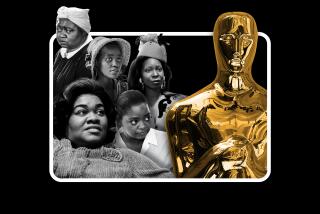Karen Morley, 93; Star of 1930s Films Was Blacklisted in ‘50s
- Share via
Karen Morley, who starred in such 1930s films as “Scarface” opposite Paul Muni, with Greta Garbo in “Mata Hari” and with Jean Harlow in “Dinner at Eight” before being blacklisted during the McCarthy era, has died. She was 93.
Morley died March 8 of pneumonia at the Motion Picture and Television Hospital in Woodland Hills.
Born Mildred Litton on Dec. 12, 1909, in Ottumwa, Iowa, she was adopted by well-to-do parents who moved her to Hollywood when she was 14 because she had symptoms of tuberculosis. After a year in premed at UCLA, she became attracted to theater and switched to studies at the Pasadena Playhouse.
Adopting her stage name, Karen Morley landed an MGM contract and started cranking out film noir and other “talkies” at the rate of nine a year.
She appeared in about four dozen films, from her first credited role in the 1931 “Inspiration” to her last significant film, the 1951 remake of Fritz Lang’s harrowing 1931 study of a child murderer, “M.”
Morley’s favorite remained director Howard Hawks’ “Scarface,” in which she played the stunningly sensual moll Poppy to Muni’s gangster Scarface. The film, shot in 1931 and released in 1932 after extra scrutiny by censors, was considered the most powerful of the 1930s gangster films.
“Scarface” and Morley were highlights of the 1999 San Francisco International Film Festival series “The Unvanquished,” a salute to blacklisted performers.
“Everybody was in awe of Paul Muni, he was so great,” she recalled then. “I was just barely of age, and that set was an exciting place to be. It was all men, and there I was prancing around in gowns that barely got past the censors.”
Discounting later compliments for pioneering the sharp-talking, humorous, independent woman role, Morley always said she simply took the parts handed her.
But she did balk at roles she considered offensive, including one in which she was to horse-whip a peon and then be horse-whipped by him after he gained power.
And, in a studio-controlled contract system, Morley dared to leave MGM in 1934 after bosses fumed over her marriage to director Charles Vidor, which she kept quiet, and her decision to have her son Michael.
But it was McCarthyism, rather than any studio disputes, that proved disastrous to the actress’ screen career.
“Nobody could imagine just how terrible McCarthyism would be,” she told the San Francisco Examiner in 1999. “So many careers went down the toilet.”
In another interview at the time of the 1999 festival, she told the San Francisco Weekly: “I was what you’d call a ‘pillow red.’ I became a communist because I fell in love with a man who was a red and entered the Army to take care of the fascists, and I knew it would please him if I became one.”
Although Vidor, whom she divorced in 1943, was a Hungarian Jew and communist who had battled fascism in Europe, Morley was referring to her second husband, actor Lloyd Gough, who died in 1984. While he was in Army training in North Carolina during World War II, Morley went there and became involved in organizing tobacco workers.
When the couple returned to Hollywood at war’s end, she turned her newly gained union expertise to the Screen Actors Guild, becoming one of its few radicals, demanding action on wage and fairness issues.
Her outspokenness in favor of honoring picket lines during the final strike in 1946 by nine craft unions known as the Conference of Studio Unions prompted several witnesses, including actor Robert Taylor, to brand her a communist before the House Un-American Activities Committee.
“The Actors Guild had been held to a 10-year no-strike agreement, and when that 10 were up, the progressives in the Screen Actors Guild made all these forward-looking proposals, most of them written on my dining room table,” she said.
“I was blacklisted because of this activity.... From that time on, I always had the studios on my neck.”
After dodging her own subpoenas, Morley testified before the committee in Washington, D.C., on Nov. 13, 1952. When she was asked if she was or ever had been a member of the Communist Party, she took the 5th Amendment to prevent possible self-incrimination.
At that time, although she had just completed the film “M,” she said blacklisting had made finding jobs in movies, television and radio almost impossible for her.
She and Gough, who also testified and also had been blacklisted by Hollywood, moved to New York City, where he found some work in theater. They appeared together on Broadway in “The Banker’s Daughter” in 1952.
Morley ran for lieutenant governor of New York on the American Labor Party ticket in 1954.
The actress had a few guest roles on television series of the 1970s, including “Kojak,” and was much sought after in recent years for documentaries about stars with whom she worked, including Garbo and John Barrymore.
She is survived by three grandchildren and two great-grandchildren.
More to Read
Only good movies
Get the Indie Focus newsletter, Mark Olsen's weekly guide to the world of cinema.
You may occasionally receive promotional content from the Los Angeles Times.










